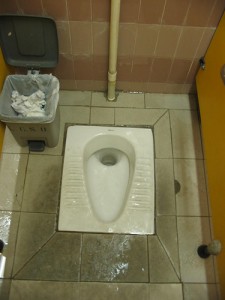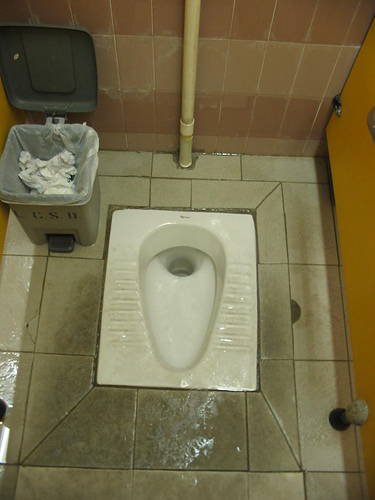 It’s embarrassing. Mortifying. Humiliating. You’re on an international trip enjoying yourself, when all the sudden you feel your stomach gurgling. Then cramping. Then the frantic race to the bathroom. It’s even worse if you encounter a squat toilet. Nearly every world traveler has experienced travelers’ diarrhea at least once. For some, it’s just a brief inconvenience, but for others, it can be prolonged and even pose a major health risk.
It’s embarrassing. Mortifying. Humiliating. You’re on an international trip enjoying yourself, when all the sudden you feel your stomach gurgling. Then cramping. Then the frantic race to the bathroom. It’s even worse if you encounter a squat toilet. Nearly every world traveler has experienced travelers’ diarrhea at least once. For some, it’s just a brief inconvenience, but for others, it can be prolonged and even pose a major health risk.
I used Help a Reporter Out to gather expert advice on this frustrating ailment. I not only got information from medical professionals, but I received several interesting anecdotes and unusual cures from travelers. This will be a long post, but I hope it helps you the next time you’re traveling out of the country and facing Montezuma’s revenge!
What causes travelers’ diarrhea?
Dr. Myles Druckman has specialized in traveler health for decades and oversees day-to-day medical operations for International SOS, a travel and medical assistance provider for individuals and corporate clients. “When you travel, you are likely to encounter bacteria and other agents that are native to the area but foreign to your body, which means that even with the best protections and preventative measures, you may develop diarrhea as a result of your body’s reaction to this unknown substance,” Druckman says. “Infectious agents typically enters the body either through water and food, or because of improper hygiene. For instance, touching an unclean object and then touching one’s mouth.”
According to documents from International SOS, “Travelers’ diarrhea is the most common travel-related illness. It usually occurs within the first week away from home and affects between 20 and 50 percent of all those who go abroad. Travelers are especially likely to become ill at high-risk destinations such as developing nations in Latin America, Africa, Asia and the Middle East.”
What are the symptoms?
Sally Black is former registered nurse turned travel agent/world adventurer who has experienced travelers’ diarrhea herself. In addition to diarrhea, “sufferers can expect stomach cramps and/or vomiting, dehydration and sometimes fever,” she explains. “Generally it’s caused by an Ecoli type of bacteria. Normally you’ve got it if you have any or all of these symptoms along with three or more watery stools per day.”
Who is at risk?
According to Larlene Dunsmuir, a family nurse practitioner at Providence Portland Medical Center Traveler’s Clinic, “Traveler’s diarrhea is very common and can occur even in travelers who are careful with food and water precautions. It actually seems to be most common in young, healthy adult travelers,” she says. “The reason for this is unclear but it is thought that they may be more adventurous in their dietary habits as well as less diligent about precautions. There also seems to be seasonal increases in incident of traveler’s diarrhea.”
While young adult travelers are very resilient, travelers’ diarrhea can be risky for others.”Those with compromised immune systems also seem to be at greater risk, as are those who have chronic gastrointestinal problems and those who take acid blockers.” Dunsmuir says. “Traveler’s diarrhea in and of itself is not a serious health condition, although it is an inconvenience. Because you lose both fluids and electrolytes, with diarrhea, you can become dehydrated. Children and the very elderly are the most susceptible to the effects of dehydration, which can be severe.”

How to prevent it
Druckman says there are two key ways to protect yourself against travelers’ diarrhea. “First, is hygiene,” he says. “You should wash your hands regularly while you are traveling, as this simple measure will always help protect against illness like diarrhea.” Consider bringing along some sanitizing wipes or gel.
The second key is to carefully consider what you are eat and drink. “Depending on where you are traveling, it may be advisable to avoid drinking water from the tap,” Druckman says. “This is particularly true in developing countries. In these areas, travelers should stick to water, sodas and juices that are bottled. Be wary also of putting ice in your drinks, as the cubes are often made from tap water. When eating, know that there are risks associated with raw vegetables, which are often washed in tap water. And make sure anything you eat is prepared properly and cooked thoroughly.”
Black says you may even want to consider brushing your teeth with bottled water. She adds that many countries do not have the sanitation laws that we do, so travelers should be very careful about eating food from street vendors. Black says that fruits that require peeling are often fine to eat.
How to treat it
To treat the symptoms of traveler’s diarrhea, Dunsmuir recommends that you take an over-the-counter (OTC) anti-diarrheal. “Most cases will improve with fluids, rest, and the OTC remedies such as Imodium-AD or Pepto Bismol,” she says. “To prevent dehydration, it is advised that you use an electrolyte replenishment. There are several available on the market–the best is labeled WHO-ORS.” Dunsmuir says you can also make your own using the following recipe:
Mix together:
- 1/2 teaspoon salt
- 1/2 teaspoon baking soda
- 2 tablespoons sugar or rice powder
- 1/4 teaspoon potassium chloride (salt substitute)
- 1 liter safe drinking water
Dunsmuir says that those suffering from diarrhea should avoid alcohol, caffeine and dairy products. She adds that it’s also important to stay hydrated. “Clear juices that have been pasteurized, weak tea, clear soups and decaffeinated sodas and sports drinks are all good options,” she said. “You can eat dry crackers or toast. Some people find the BRAT diet helpful. The BRAT diet consists of bananas, rice (white), applesauce, and toast (dry). Resume your regular diet gradually, once diarrhea has subsided.”
When to seek medical help
“In most circumstances, bouts of travelers’ diarrhea are self-limiting, which means the illness passes on its own, without medical intervention,” says Druckman. However, it can be dangerous, especially if you become severely dehydrated. “If your diarrhea is worsening rapidly, you have a fever or there is blood or a dark color in your stool, you should seek immediate medical attention,” he says.
“If you are in a developing country or remote area where access to medical resources are limited, it is important to seek medical attention early–even while symptoms may be mild, because it may take time to secure appropriate medical treatment if your condition worsens. Seeking medical attention early can also help ensure you are monitored and managed throughout the illness, which means any changes in your condition are likely to be identified and addressed expediently,” Druckman explains.
Personal anecdotes and unusual cures
This comes from Kristen Lohman Burris, a nationally recognized acupuncturist and herbalist:
Before leaving on your trip, purchase ginger extract from your local herbalist or health food store to prevent and event treat severe travelers diarrhea. Take three dropperfuls daily beginning three days prior to leaving and continue throughout your visit. If you forget to take this precautionary step simply start taking the ginger extract at the first sign of discomfort and continue for an entire week after your bout of diarrhea, sweating or even fever. You may squirt it directly into your mouth or add to bottled water and sip throughout the day. [she also quoted a study that found that ginger does have a healing property in cases of diarrhea from E. coli]
This comes from Kimberly Thompson, Author of Gypsy Phoenix: A Birthright of Hope
I’m not an “expert,” but I can tell you that there is one infallible, natural cure for that particular ailment that always works: blackberry juice. Don’t believe me? Research it. An elderly friend of mine told me about it years ago, because I went through almost a week of torment with diarrhea. After taking it, my body “straightened out,” so to speak. You don’t have to search for blackberry juice; a bag of frozen blackberries can be found in any grocery store… either crush them and drink the juice or eat them whole (about a 1/2 cup should do the trick). And the cost? Minimal, since you’re not required to have a prescription for blackberries or take a trip to the doctor’s office.
This comes from Lori Grant of AlwaysYourWeigh.com
I am not an “expert” medical doctor, but I have traveled to many far flung places. I highly recommend Cipro [an antibiotic]; my travel doctor prescribes it to my husband and I whenever we travel abroad. I have needed it twice in the last 11 years of traveling. Once in Africa (it works within a couple of hours) and once on my way home from Nepal. Starting Cipro at three in the morning in Masaii Mara, Kenya allowed me to be able to get on/in a hot air balloon for the experience of a lifetime three hours later. Without it I would never have been able to have done it. Since that trip, we always get a prescription filled for it. Thankfully I have only needed it one other time.
This comes from Holly Stokes, author of Lighten Up!
I thought I’d share my quick story because it could really help travelers. Traveling in Mexico, four days into my trip, I got a severe case of Montezuma’s revenge. I had explosive diarrhea, and nothing seemed to help. The locals even made me a tea, which bless their hearts, didn’t work. Finally, I remembered my herbalist training that I’d done years earlier. I went to the local market and bought raw garlic. I peeled the cloves, and because I can’t eat raw garlic, I wrapped it in a tortilla skin and downed about three cloves. I felt it burn in my stomach a little, but what do you know–no more intestinal distress, and I was able to finish out my two-week excursion. Why? Garlic is an antibacterial, and its raw state is most potent. The antibacterial effect of garlic killed off the bug in my intestines. I smelled like garlic for a few days, but I was able to finish my backpacking trip feeling great!
This comes from Dr. Tom Potisk, “The Down-to-Earth Doctor”
I went on a week-long voluntary medical mission to Belize and stayed in an orphanage. The kids served us doctors breakfast. One morning they made Kool-aid and I assumed they used bottled or purified water. Surprise! The next morning I could not stand up due to severe abdominal cramps, and spent the next two days frequently crawling from bed to toilet. Since then I’ve learned to build up my intestinal resistance before traveling to these types of places. I do it by taking at least 2 grams per day of probiotic supplementation for two weeks before the trip and during. Probiotics are the normal healthy bacteria that belong in our intestines and aid our digestion. They can be obtained at any health food store. Through experimentation, I learned that yogurt, although containing probiotics, do not have enough to make the difference needed.
This comes from Barbara DesChamps, author of It’s In The Bag: The Complete Guide to Lightweight Travel from Château Publishing:
Recently, I have heard and read testimonials about Grapefruit Seed Extract, or GSE. It is said to be more effective than chlorine or iodine against a variety of micro-organisms, and at a lower concentration, down to ten parts per million. At this rate, you can just discern a slight bitterness, and no odor. People are also claiming that, at higher concentrations, it can un-do the damage from drinking untreated water! Some also claim that it is effective externally against fungal and other infections. I can’t vouch for any of this except the taste test; you’ll need to read the literature and make up your own mind.
In case of emergency
Cheryl Foster emailed me and told me that she created a product to help women caught in embarrassing situations like this who need an extra pair of undies. “It’s happened to me too…travelers’ diarrhea is one of the reasons I developed SPairz,” she says. “SPairz are 100% cotton women’s briefs that are compressed and shrink-wrapped so women can carry them discretely wherever they go. They are about the size of a package of gum and fit great in backpacks, carry-ons and purses. SPairz come in eight sizes (X-small through 3X).” I say it can never hurt to be prepared and have an extra pair of panties on hand.
Have you ever suffered from travelers’ diarrhea? What treatments worked for you, if any?
![]() photo credit: angermann and tracy hunter
photo credit: angermann and tracy hunter




